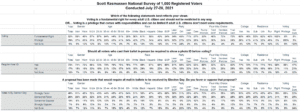Fifty-two percent (52%) of voters believe “voting is a fundamental right for every adult U.S. citizen and should not be restricted in any way.” A Scott Rasmussen survey found that 39% believe instead that “voting is a privilege that comes with responsibilities and can be limited if adult U.S. citizens don’t meet some requirements.”
The survey also found that 73% of voters believe all voters who cast their ballot in-person should be required to show a photo ID before voting. Just 17% disagree.
Additionally, 74% favor a proposal that would require all mail-in ballots to be received by Election Day. Seventeen percent (17%) are opposed.
These results suggest that voters do not see common sense voting rules as a restriction on voting.
In fact, among those who say there should be no restrictions on voting, 69% favor photo ID requirements and 70% believe all ballots should be received by Election Day.
The question about whether voting is a right or a privilege was modeled after a similar question asked by the Pew Research Center. The only difference is that the Scott Rasmussen question included a not sure option. However, the results from both surveys were very similar.
The Pew Center study found that 56% of voters are confident that those not legally qualified to vote are prevented from casting a ballot. Forty-two percent (42%) lack such confidence.
There is far more confidence in another aspect of the voting process. Seventy-seven percent (77%) of voters believe that everyone who is eligible and wants to vote is able to cast a ballot. Just 23% disagree.
SIGN UP to receive Scott’s free email newsletter.
CHECK OUT Scott’s latest polls.
Note: Neither Scott Rasmussen, ScottRasmussen.com, nor RMG Research, Inc. have any affiliation with Rasmussen Reports. While Scott Rasmussen founded that firm, he left more than seven years ago and has had no involvement since that time.
Methodology
The survey of 1,000 Registered Voters was conducted by Scott Rasmussen using a mixed mode approach from July 27-28, 2021. Field work for the survey was conducted by RMG Research, Inc. Most respondents were contacted online or via text while 232 were contacted using automated phone polling techniques. Online respondents were selected from a list of Registered Voters and through a process of Random Digital Engagement. Certain quotas were applied, and the sample was lightly weighted by geography, gender, age, race, education, internet usage, and political party to reasonably reflect the nation’s population of Registered Voters. Other variables were reviewed to ensure that the final sample is representative of that population.



